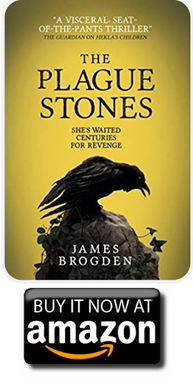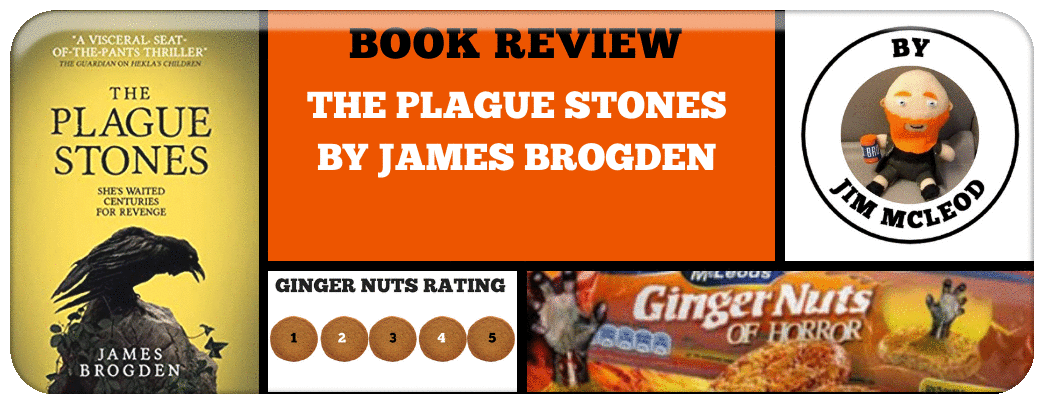|
Make sure you read through to the end for the chance to win a James Brogden Prize bundle Longtime readers of Ginger Nuts of Horror will be well aware of our love for the author James Brogden, his previous two books from Titan Books both made my top ten lists for the year of their publications. Hekla's Children was a taught horror thriller that saw an unspeakable evil from the Bronze age reek havoc on the modern world, and The Hollow Tree used the legend of Bella in the Wych Elm as the inspiration for a rich folk horror tale of rage and redemption. Both of his previous novels featured certain common themes and motifs, such as the horrors of the past resurfacing to take revenge on the modern world, and the notion of stories evolving out of the liminal space between what was and will be (stop singing Que Sera, Sera, who do you think you are Doris Day?) how one act of passion, evil, or stupidity can cause ripples down through the generations. With The Plague Stones, Brogden takes these themes and motifs and turns them up to eleven to deliver a heart-stopping tale of terror out of the depths of time. After a particularly nasty break-in which saw their son traumatised and injured, Trish Feenan and her husband decide to relocate to the quaint and cosy village of Haleswell , a village that can trace its history to the time of the Great Plague, a village that has been under the guidance and management of the Haleswell Village Trust. Now, this isn't your average group of busybodies, and well-doers, oh no, this select group of people can trace their heritage to the foundation of the village, and the point in time where the village sealed its fate for all of those who rise to becoming a member of the Trust. Little do the Feenans know that just by moving to the village and becoming one of the Trustees that they have placed their lives and very souls in the path of a vengeful entity, which makes the burglar who broke into their home look like a soft, warm kitty. The Plague Stones is first and foremost a truly terrifying novel, the opening chapter dealing with the break-in that sets in motion the main narrative thrust of the book, is one the most tense and "heart in your mouth" pieces of writing I have ever read. Brogden captures the brutality and sense of helplessness that such an event would elicit. While there is nothing particularly nasty or graphic in the chapter, the implication and sense of dread of what could happen is palpable to the extreme. I've always had a healthy distrust of things such as neighbourhood watches, resident committees, gated communities and all manner of things that try to bring the sense of belonging to a place of residence to your doorstep. With films such as Society, and books like Bentley Little's The Association have, over the years given me a severe fear any attempt to institutionalise my day to day life, and trust me, the Haleswell Village Trust does nothing to allay these fears. With their yearly ritual of the blessing of the Plague stones, coming across as way to Wicker Manish to be anything other than ultra creepy, to their insistence of knowing and being a part of every little bit of the Feenan's lives, you just know that they don't have the best interests of the residences at heart. Lead by the enigmatic and downright nasty Nash, you could argue that they are the real villains of this book. Which brings us to Hester, initially appearing like one of those figures you always see out of the corner of your eye, or as a quiet figure lurking in the shadows, she stars out as being a focus for your sympathy, but when she goes all out in her bid for revenge, she is nothing short of devastating force of retribution. Brogden has created a strong and powerful central character, on which to pin the main narrative drive of the story. Hester's story highlights the sadly underused motif of the "victim is never to blame, we rarely ever get to hear a story from the victims point of view, it's always the perpetrator that we get to hear about, and in some cases even become infamous. While Hester is without a doubt evil, she is evil not because of who she is, but because of what was done to her. And Brogden handles this with a truly sympathetic ear to her plight. This is her story, and all the other characters in the book serve to drive the story forward. That's not to say that Brogden hasn't taken care to create a diverse and satisfying cast of characters, it's more a case of them being cyphers that serve that story. With perhaps the exception of Nash the head of the trust, who exists like a malevolent thread of privilege that binds the two periods of the story together. Like his forefathers during the time of the plague, his mantra of"only having the best interests of the community" at heart create more problems than they actually solve. Maybe if he and his forefathers were more humane, then all of the tragedies that happen wouldn't have. Rajko is another excellent character, a tragic anti hero, driven to do unspeakable things by the manipulations and thoughtlessness of both Nash and Hester. You hate what he ends up doing, but you cannot help but feels sorry and understand why he does them. The main themes of The Plague Stones are how we are never truly free of our past, and how our past sins will soon catch up with us. And Brogden handles these with a deft flair, allowing the dual timelines of the narrative to flow and interlock with each other revealing just enough information and action to keep the reader hooked as the horror unfolds. However, Brogden also uses this book to tackle some other essential themes, such as the unjust nature of social injustice. The parallels between the Hasewell's haves and have nots of both times lines are heartbreaking, with modern day slumlords standing in for the fearful village fathers of yore. Brogden also manages to convey a believable thread of, for want of a better word, kitchen sink drama. The dynamics of the interpersonal relationships between the members of the Feenan clan are exceptionally well done, from the mother who just wants the best for her family, to the son struggling to find his way in life, never having both feet planted firmly in any social strata. Or the father, who also wants the best for his family, but also feels resentful for not being the one who has done it. He is a man driven by a pride that is shackled by having to toe the party line. The sense of fury and frustration bubbles just under the surface of all the scenes in which he plays a vital role. The Plague Stones cements Brogdens reputation as both an accomplished storyteller and as a master of the modern folk horror tale. They say you are never more than ten feet away from a rat, and after reading this book, you'll wish you never knew that fact. THE PLAGUE STONES BY JAMES BROGDEN From the critically acclaimed author of Hekla’s Children comes a dark and haunting tale of our world and the next. Fleeing from a traumatic break-in, Londoners Paul and Tricia Feenan sell up to escape to the isolated Holiwell village where Tricia has inherited a property. Scattered throughout the settlement are centuries-old stones used during the Great Plague as boundary markers. No plague-sufferer was permitted to pass them and enter the village. The plague diminished, and the village survived unscathed, but since then each year the village trustees have insisted on an ancient ceremony to renew the village boundaries, until a misguided act by the Feenans’ son then reminds the village that there is a reason traditions have been rigidly stuck to, and that all acts of betrayal, even those committed centuries ago, have consequences… Competition timeFor a chance to win a copy of this book courtesy of Titan Books and since i am feeling generous I'll also, personally, throw in a copy of James' other two books from Titan simply retweet this pinned tweet on my Twitter Profile
https://twitter.com/GNHorror/status/1133275016911630336 For a bonus entry into the giveaway please leave a comment below on this blog post. Prize draw will take place on 07 June 2019
Dave Watkins
28/5/2019 08:42:39
Great review - I've not heard of James before this, so would love to check this out. Dave Watkins
Jim Mcleod
28/5/2019 09:14:01
I'd suggest going right back to The Narrows, then working your way through his back catalogue. His last three books while not connected as such can be viewed as a liminal world collection 28/5/2019 10:51:03
What a fab review! 28/5/2019 13:49:03
This sounds awesome!! Can't believe I've never heard of this author before.
Trudi Reynolds
2/6/2019 01:35:00
Trudi Reynolds 5/6/2019 16:24:24
Awesome review! Sounds exactly like the type of book I would enjoy.
Tammy Neal
7/6/2019 08:15:51
Tammy neal Comments are closed.
|
Archives
May 2023
|








 RSS Feed
RSS Feed

